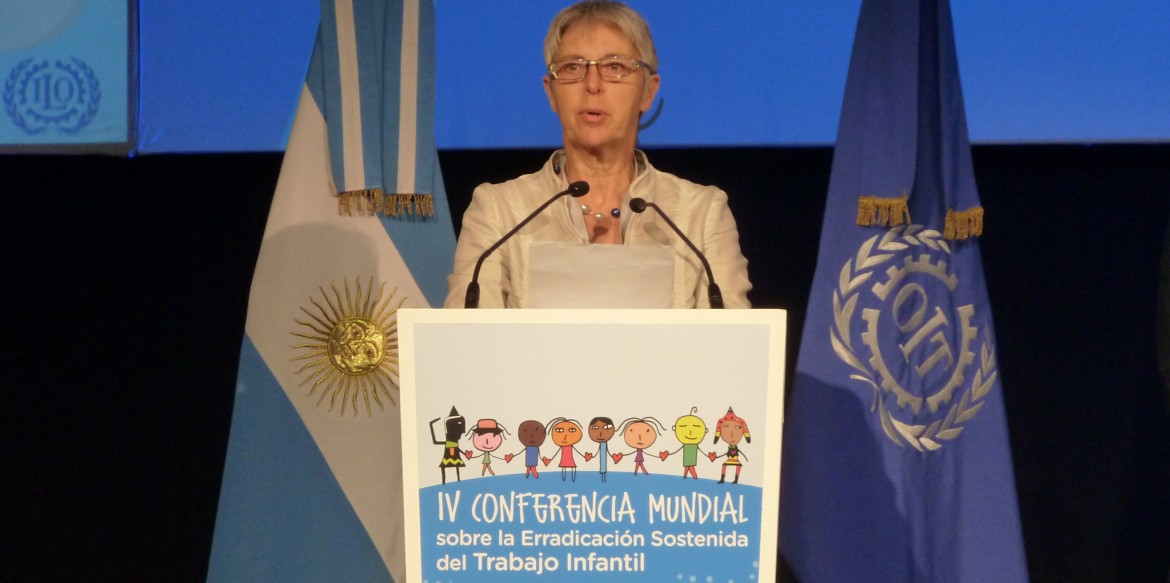22-11-2017, Stop Kinderarbeid | Op 16 november jl. hebben de duizenden deelnemers aan de Wereldconferentie over Kinderabeid in Argentinië de Buenos Aires Declaration on Child Labour, Forced Labour and Youth Employment (Verklaring van Buenos Aires over kinderarbeid, gedwongen arbeid en jeugdwerkgelegenheid) aangenomen. De verklaring werd voorbereid tijdens verschillende bijeenkomsten van de tripartiete partners van de Internationale Arbeidsorganisatie (ILO): de regeringen, de werkgevers en de vakbond.
Hoewel NGO’s niet direct betrokken waren bij dit proces, kon Stop Kinderarbeid haar aanbevelingen naar voren brengen tijdens voorbereidende bijeenkomsten met het Ministerie van Sociale Zaken in Nederland. Onze focus lag op de rol van het maatschappelijk middenveld, de gebieds- of gemeenschapsgerichte aanpak van kinderarbeid, het belang van kwaliteitsonderwijs en de noodzaak van toeleveringsketens die vrij zijn van kinderarbeid en andere arbeidsrechtenschendingen. Stop Kinderarbeid is verheugd om in de slotverklaring van de conferentie de erkenning te zien van het belang van een gebiedsgerichte aanpak voor het uitroeien van kinderarbeid.
Bron: Stop Kinderarbeid
Stop Child Labour celebrates child labour free zones on Universal Childrens Day
To celebrate this year’s Universal Day of the Rights of the Child, 20 November, Stop Child Labour reconfirms her pledge made during the IV Global Conference on the Sustained Eradication of Child Labour in Buenos Aires, Argentina, 14 – 16 November 2017.
The IV Global Conference on the Sustained Eradication of Child Labour brought together representatives of governments, employers’ and workers’ organizations, as well as civil society organizations from around the world to discuss the problem of child labour and possible solutions.
At the third day of the Conference Stop Child Labour made a pledge to “support and enable initiatives of local communities and civil society organizations in Africa, Asia and Latin America to tackle child labour through community based approaches as an effective method to get all children in a certain area out of work and (back) into school. This enables the creation of child labour free zones. And inspires and enriches top down policies and their implementation. Together we continue working towards a child labour free world’.
This pledge will be attached to the Buenos Aires Declaration which is the final outcome document of the Conference. The Declaration will guide, over the next four years, all efforts on the issues covered, and the total of 91 pledges of different States and other actors to make firm progress towards Target 8.7 of the Sustainable Development Goals, including the eradication of forced labour, modern slavery, human trafficking and child labour in all its forms by 2025.
Stop Child Labour is glad to see that the Declaration recognizes the importance of area-based and community interventions for eradicating child labour and forced labour. The Declarations states, among others, that civil society organizations and local communities should be involved in the development and implementation of relevant policies, strategies and action plans at all levels. And that the organizational capacity of local communities should be strengthened in their efforts to prevent, detect and eliminate child labour and forced labour; and to ensure that relevant authorities are aware of and replicate these efforts.
United Nations Universal Children’s Day is celebrated on November 20th each year to promote international togetherness, awareness among children worldwide, and improving children’s welfare. November 20th is an important date as it is the date when the UN General Assembly adopted the Convention on the Rights of the Child. Stop Child Labour is determined to contribute to the realization of all children’s rights with a specific focus on protection from work and access to formal, full-time and quality education.
(Source: Stop Child Labour)
Dutch tripartite pledge (English)
The government and social partners of The Netherlands, where possible and desirable together, and if necessary and logically within their own responsibilities, declare to take up the following actions to eliminate child labour and forced labour:
(1) The Dutch government and social partners will continue to initiate their multi-stakeholder initiatives, in particular the Responsible Business Conduct (RBC) sector agreements and the Fund Against Child Labour, to eliminate child labour and forced labour. Within the RBC sector agreements, several stakeholders, among which the trade unions, the sectoral employers’ organisations and the government, commit to accomplish tangible results to eliminate child labour and forced labour. These commitments are based on the existing goals and norms of the UN Guiding Principles on Business and Human Rights, the OECD Guidelines for Multinational Enterprises, the ILO MNE Declaration and the ILO Fundamental Principles and Rights at Work. And where relevant, they notably include discussions about wages on the basis of para 41 and 42 of the ILO MNE Declaration and para 42 of the OECD Guidelines.
Furthermore, the Netherlands will support, together with the appropriate parties, other community based and multi-stakeholder projects, like the Child Labour Free Zones in which the trade unions have an important role.
(2) The Dutch government confirms its membership to the Alliance 8.7, and will specifically support and actively take part in the Global Supply Chains (GSC) Action Group of the Alliance 8.7. One of the goals of the Alliance 8.7 is to conduct research and share knowledge. In that light, the Dutch government will make budget available to conduct further research on the elimination of child labour and forced labour through Global Supply Chains.
(3) The government of the Netherlands will make a contribution to a follow-up event of the ILO, focused on the progress to reach Sustainable Development Goal 8.7 and based on the agreements made here in Buenos Aires.


